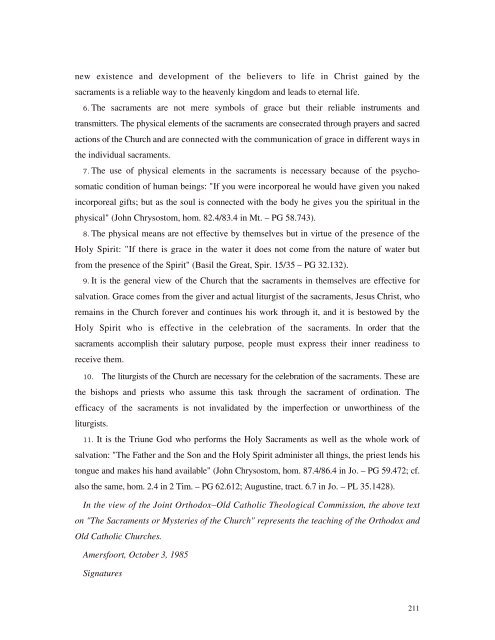The Road to Unity - Old Catholic Church of North America
The Road to Unity - Old Catholic Church of North America
The Road to Unity - Old Catholic Church of North America
Create successful ePaper yourself
Turn your PDF publications into a flip-book with our unique Google optimized e-Paper software.
new existence and development <strong>of</strong> the believers <strong>to</strong> life in Christ gained by thesacraments is a reliable way <strong>to</strong> the heavenly kingdom and leads <strong>to</strong> eternal life.6. <strong>The</strong> sacraments are not mere symbols <strong>of</strong> grace but their reliable instruments andtransmitters. <strong>The</strong> physical elements <strong>of</strong> the sacraments are consecrated through prayers and sacredactions <strong>of</strong> the <strong>Church</strong> and are connected with the communication <strong>of</strong> grace in different ways inthe individual sacraments.7. <strong>The</strong> use <strong>of</strong> physical elements in the sacraments is necessary because <strong>of</strong> the psychosomaticcondition <strong>of</strong> human beings: "If you were incorporeal he would have given you nakedincorporeal gifts; but as the soul is connected with the body he gives you the spiritual in thephysical" (John Chrysos<strong>to</strong>m, hom. 82.4/83.4 in Mt. – PG 58.743).8. <strong>The</strong> physical means are not effective by themselves but in virtue <strong>of</strong> the presence <strong>of</strong> theHoly Spirit: "If there is grace in the water it does not come from the nature <strong>of</strong> water butfrom the presence <strong>of</strong> the Spirit" (Basil the Great, Spir. 15/35 – PG 32.132).9. It is the general view <strong>of</strong> the <strong>Church</strong> that the sacraments in themselves are effective forsalvation. Grace comes from the giver and actual liturgist <strong>of</strong> the sacraments, Jesus Christ, whoremains in the <strong>Church</strong> forever and continues his work through it, and it is bes<strong>to</strong>wed by theHoly Spirit who is effective in the celebration <strong>of</strong> the sacraments. In order that thesacraments accomplish their salutary purpose, people must express their inner readiness <strong>to</strong>receive them.10. <strong>The</strong> liturgists <strong>of</strong> the <strong>Church</strong> are necessary for the celebration <strong>of</strong> the sacraments. <strong>The</strong>se arethe bishops and priests who assume this task through the sacrament <strong>of</strong> ordination. <strong>The</strong>efficacy <strong>of</strong> the sacraments is not invalidated by the imperfection or unworthiness <strong>of</strong> theliturgists.11. It is the Triune God who performs the Holy Sacraments as well as the whole work <strong>of</strong>salvation: "<strong>The</strong> Father and the Son and the Holy Spirit administer all things, the priest lends his<strong>to</strong>ngue and makes his hand available" (John Chrysos<strong>to</strong>m, hom. 87.4/86.4 in Jo. – PG 59.472; cf.also the same, hom. 2.4 in 2 Tim. – PG 62.612; Augustine, tract. 6.7 in Jo. – PL 35.1428).In the view <strong>of</strong> the Joint Orthodox–<strong>Old</strong> <strong>Catholic</strong> <strong>The</strong>ological Commission, the above tex<strong>to</strong>n "<strong>The</strong> Sacraments or Mysteries <strong>of</strong> the <strong>Church</strong>" represents the teaching <strong>of</strong> the Orthodox and<strong>Old</strong> <strong>Catholic</strong> <strong>Church</strong>es.Amersfoort, Oc<strong>to</strong>ber 3, 1985Signatures211


